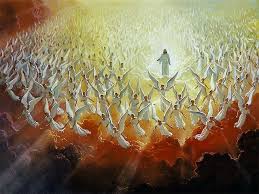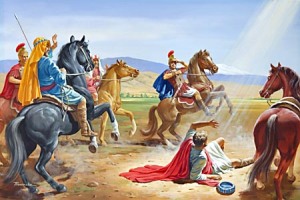Category Archives: The Story
The Story Chapter 31 Reflection Questions
Use these reflection questions for your personal study time of Chapter 31. (Taken from the Adult Study Guide.)
- Why might Christians resist studying this book? According to this chapter, what are the benefits connected to studying Revelation? (Hint: p. 379, 387; Rev. 1:3, 22:7)
- Make a list of the various ways God the Father and God the Son are described throughout this chapter of The Story. For example, on page 379, the Father is him who is, and who was and who is to come; Jesus Christ is the faithful witness. After completing your list, discuss what one or two of these descriptions mean.
- Jesus’ messages to the seven churches usually follow a general pattern: a description of Himself, a commendation, a rebuke, a warning or instruction, and a promise. Compose a letter to your church using this format.
- Notice the description of the throne room of heaven (p. 382, Rev. 4:1-6). Look up Ezekiel 1:26-28, Exodus 19:16 and 20:18, Job 37:4 and John 12:27-28. What do these images communicate about God?
- What four-fold reason makes the Lamb worthy to open the scroll and receive praise (p. 383)?
- Read Matthew 24:29-44, 1 Thessalonians 5:1-11 and Titus 2:11-14. How should you live in anticipation of Christ’s return?
- From what you have learned in this chapter about the great white throne judgment and the lake of fire, how might you respond to the person who does not believe that a loving God could ever sentence anyone to hell (p. 385-386, Rev. 20:11-15, 21:8)? See also Revelation 20:10 and Matthew 25:41 for further insight.
- Find at least three similarities between the original creation (Genesis 1-2) and the new heaven and new earth (p. 385-387; Rev. 21-22). How do these sections of Scripture contribute to our understanding of God’s Upper Story and what would we be missing without them?
The Story Chapter 32
You might be saying, wait a minute, there are only 31 chapters of The Story, so why are we talking about Chapter 32? Chapter 32 is our roll in continuing the story. We are not called to be idle, but rather we have a roll to carry on the story by sharing God’s story. We have a roll to invite others to be a part of God’s story and to carry on the Good News.
I love this picture of the cat of shame. What draws shame, this cat is not participating in the God given ability of chasing mice. This cat is not fulfilling its role in using it’s gifts to rid the master’s house of mice.
How does this reflect on us? God has given us the ability and calls us to share the Good News of Jesus. How are we doing with that ability and call on our lives? Are we like the cat, watching the mouse eat the food and doing nothing? We can each do something. What can you do?
The Story Chapter 31 Reflective Questions
Use these questions for your personal study time of Chapter 31. (Taken from the Adult Study Guide.)
- Why might Christians resist studying this book? According to this chapter, what are the benefits connected to studying Revelation? (Hint: p. 379, 387; Rev. 1:3, 22:7)
- Make a list of the various ways God the Father and God the Son are described throughout this chapter of The Story. For example, on page 379, the Father is him who is, and who was and who is to come; Jesus Christ is the faithful witness. After completing your list, discuss what one or two of these descriptions mean.
- Jesus’ messages to the seven churches usually follow a general pattern: a description of Himself, a commendation, a rebuke, a warning or instruction, and a promise. Compose a letter to your church using this format.
- Notice the description of the throne room of heaven (p. 382, Rev. 4:1-6). Look up Ezekiel 1:26-28, Exodus 19:16 and 20:18, Job 37:4 and John 12:27-28. What do these images communicate about God?
- What four-fold reason makes the Lamb worthy to open the scroll and receive praise (p. 383)?
- Read Matthew 24:29-44, 1 Thessalonians 5:1-11 and Titus 2:11-14. How should you live in anticipation of Christ’s return?
- From what you have learned in this chapter about the great white throne judgment and the lake of fire, how might you respond to the person who does not believe that a loving God could ever sentence anyone to hell (p. 385-386, Rev. 20:11-15, 21:8)? See also Revelation 20:10 and Matthew 25:41 for further insight.
- Find at least three similarities between the original creation (Genesis 1-2) and the new heaven and new earth (p. 385-387; Rev. 21-22). How do these sections of Scripture contribute to our understanding of God’s Upper Story and what would we be missing without them?
The Story Chapter 31 Introduction
How does one describe heaven and eternity? How does one even come close to being able to put words unto that which is beyond words? How do we describe the One who has created us and the proximity of being with that Creator?
John tries. He tries to put words into place so that we can understand. Even with the words there is much mystery. Perhaps a good analogy is when we as humans were trying to picture the moon and had not yet begun the space program. There were many theories, but nothing like the real thing until we had sent humans and robots there to investigate.
Angel armies; The heavenly throne which is also described in Isaiah 6; The lamb who is worthy to break the seal; The silence in heaven; The new heaven and earth. Ultimately this is eternity where we are with our Creator forever.
The beauty of this new heaven and earth is that it is the exact opposite of where we began. We began in the Garden of Eden and The Fall–this is the New Jerusalem, the new garden. This is the place where there are no more tears and there is no more sadness. Why would that be? Here one will be in the presence of the Creator and the evil one will not be present. We hear the words of our Creator in saying, “I am making all things new!” God wins!
This is the place of the heavenly banquet. When we share in the Lord’s Supper here on earth we are not only remembering what Jesus has done, but we are also remembering the future–we remember the banquet to come where all who are in relationship with Jesus are invited.
As you read this last chapter of The Story this week, what strikes you most of this place of eternity? What is the biggest surprise? How will reading the end of The Story effect you as you live out the middle of The Story, knowing that you are a part of God’s bigger story?
Chris Tomlin’s song Angel Armies might also speak to you as you read this last chapter.
The Story Chapter 30
As we reflect on the end of Paul’s journeys and his final trip to Rome as a prisoner, reflect on these questions taken from the Adult Study Guide.
- From his farewell speech, describe Paul’s ministry in Ephesus (p. 363-364). Look up 1 Timothy 3:1-7 and Titus 1:5-9. What did he teach about the responsibility of elders from his personal life, his farewell address and his letters?
- In 1 Corinthians 4:16 and 11:1, and 1 Thessalonians 1:6, how was Paul an imitator of Christ throughout his ordeals and what are the implications for believers today?
- Paul was a Jewish Pharisee and a Roman citizen (p. 366) who exercised his rights as either at various times in his life. Discuss as a group the appropriate exercise of our civil rights in the light of our “heavenly citizenship”.
- What evidence of God’s grace and sovereignty can you find in Paul’s arrests, trials and travels?
- Look up Acts 28:30-31, Eph. 6:20, Phil. 1:7, Col. 4:10, 4:18 and Philemon 1. How did Paul spend his two years while under house arrest in Rome (p. 373). What lessons can you learn about dealing with disagreeable and difficult circumstances?
- Ephesians 1:1-10 (p. 373-374) teaches that as Christians we are “in Christ.” What benefits and blessings does this status bring us?
- Paul urged the believers in Ephesus to “live a life worthy of the calling” that they had received (Ephesians 4:1, p. 375). According to Paul’s letter, what does that mean?
- What makes the marriage relationship a good metaphor for the church’s relationship to Christ? What does Christ do for the church (p. 376, Ephesians 5:21-33)?
- Look up Romans 5:3-5 and 2 Timothy 3:10-17 (p. 378). What has Paul’s life taught you about perseverance? What might perseverance look like for us today?
- Paul reminded Timothy of his need to persevere in the work of preparing a future generation of Christian servants using the three illustrations of a soldier, athlete and farmer (2 Timothy 2:1-7, p. 377). How does each one help Timothy fulfill his call while facing hardships? Which of these traits do all believers need to fulfill their service to the Lord, even today?
The Story Chapter 30 Introduction
Do you remember the early airline industry? Does Pan Am mean anything to you?
I used to travel around the world in a previous job. I loved my job. I loved meeting the people of other lands and learning about their culture and lives. I loved eating their food! I was blessed to have been in the international circuit for five years, in fact I had so many “points” on Pan Am that I had two free 30 day world passes on Pan Am. (Which my husband and I subsequently used.) Those were in the days when you sat for every mile earned.
I also have shame in my previous life. That shame is that I met people from every land and country, and never once shared the Good News of Jesus Christ with them. In fact I remember one time in particular when the conversation moved towards my religious beliefs I quickly changed the subject. Like Paul, I was on fire, but for the wrong things. Like Paul I was using my talents and gifts, not for bad things, but not for the purpose which God intended them to be used for.
Praise God that we serve a God of grace who says, “I have covered your past with my blood, now let’s move into the future together.” Praise God that God has taken me with all my brokenness and pain and created something new. We are new in Christ Jesus. Transformation is possible. A resurrection of new possibilities exist in this life and beyond.
God took Paul and created something new. Paul went on his “pan-am” journeys, when journeying was not so easy, and was willing to risk everything in order to share the Gospel of Jesus Christ. The message was so compelling that he was willing to forgo everything: being stoned, beaten and imprisoned for the opportunity to share the Good News. New churches were planted all over the “known world” of the Roman Empire because of the work of Paul, who ultimately gave his life for the sake of sharing the Gospel message.
God has taken me too, and created something new. I would love a “do over” for some of the missed opportunities, but I also recognize that there are new opportunities ahead. I pray I don’t miss those new opportunities that are placed before me.
How about you? What opportunities are you facing to be like Paul and risk everything to share the Good News of Jesus?
This song reminds me of the change God works in us, and how we are to be used for God’s splendor.
The Story Chapter 29 Reflection Questions
Paul was now using his zeal to share the Good news about Jesus. Paul and Barnabas were set apart to be missionaries to the gentiles. Watch his pattern when he entered each new city. How did he begin addressing the people to tell them the Good News? Use these questions for reflection for this week’s lessons.
- God set apart Saul (Paul) and Barnabas for foreign mission work (p. 337) to help fulfill the mandate to be witnesses “to the ends of the earth,” (Acts 1:8). Review the list of missionaries supported by our church. Read about each and pray for the needs that are listed for each one.
- What differences do you find in Paul’s message to the Jews in the synagogue (p. 338, 339) as compared to his message to the Gentiles (p. 340, 342)? Discuss applications we might make today for reaching different people groups with the same gospel.
- Compare the conversions of Lydia and the jailer at Philippi (p. 341-342). What differences do you find? What similarities?
- What makes the Church in Thessalonica “a model to all the believers,” (p. 344-345; 1 Thess. 1:1-2:8) and what application can we make for our church if we want to be known as a model church?
- What problem seems to be at the root of the divisions and quarrels in the Church at Corinth? (p. 351, 1 Cor. 1:10-13, 3:1-11) Do you see any lessons here for our church?
- Read 1 Cor. 12, Rom. 12:3-8, and Eph. 4:1-7, 11-16. Why is the human body a good metaphor for the church and how does it relate to spiritual gifts?
- According to Paul’s letter to the Galatians, does freedom from the law grant freedom to sin (p. 355-357, Gal. 5:13-26)? What are some results of living by the Spirit?
- What is the relationship between righteousness and faith and why do you suppose Paul used Abraham to prove his point? (Hint: The Jews placed their trust in keeping the Law and the fact that they had been circumcised.)
- Of all the books in the Bible, Paul’s letter to the Romans most clearly outlines a pattern we can follow to lead a person to Christ. It shows man’s lost condition and makes clear what we must do to receive what God has done to correct our sad condition. This collection of verses has often been called “the Romans Road to salvation.” Trace the following verses, perhaps even marking them in your Bible. Romans 3:23à 3:10-11à 6:23 à 5:8 à 10:9-13 à 5:1, 8:1, 8:38-39. In 25 words or less, what are the essentials of the gospel? (Hint: Review 1 Cor. 15:3-4) How do you think the Romans Road could help you share your faith in the future?
The Story Chapter 29 Introduction
Paul wrote much of the New Testament, yet he was one who began his career persecuting the church. Paul was on his way to Damascus to round up those following Jesus when he had an experience with the living God; with the resurrected Jesus.
Have you had an experience with the living God? What did that look like? Did that cause you to shift your thought process or your life style in the opposite direction?
After Saul, now named Paul’s experience, he became the biggest champion for the church. In fact, he made three missionary journeys into the heartland of the Roman Empire in order to share the Good News with the Gentiles, with non-Jews.
What are we willing to do in order to share the Good News with others? Are we willing to do a complete life style change? Are we willing to talk about Jesus even if it makes us uncomfortable? Here is a list of things that Paul persevered through in order to tell others the Good News that Jesus is alive!
“23 Are they servants of Christ? (I am out of my mind to talk like this.) I am more. I have worked much harder, been in prison more frequently, been flogged more severely, and been exposed to death again and again. 24 Five times I received from the Jews the forty lashes minus one. 25 Three times I was beaten with rods, once I was pelted with stones, three times I was shipwrecked, I spent a night and a day in the open sea, 26 I have been constantly on the move. I have been in danger from rivers, in danger from bandits, in danger from my fellow Jews, in danger from Gentiles; in danger in the city, in danger in the country, in danger at sea; and in danger from false believers. 27 I have labored and toiled and have often gone without sleep; I have known hunger and thirst and have often gone without food; I have been cold and naked. 28 Besides everything else, I face daily the pressure of my concern for all the churches. 29 Who is weak, and I do not feel weak? Who is led into sin, and I do not inwardly burn? 30 If I must boast, I will boast of the things that show my weakness. 31 The God and Father of the Lord Jesus, who is to be praised forever, knows that I am not lying.” 2 Corinthians 11
What are we willing to do to share Jesus?
The story chapter 28 post sermon
Jesus gave us a commission. In light of that commissioning, read the words of Oscar Romero.
Prophets of A Future Not Our Own
It helps now and then to step back and take a long view.
The Kingdom is not only beyond our efforts,
it is beyond our vision.
We accomplish in our lifetime only a fraction
of the magnificent enterprise that is God’s work.
Nothing we do is complete, which is another way of
saying that the kingdom always lies beyond us.
No statement says all that could be said.
No prayer fully expresses our faith. No confession
brings perfection, no pastoral visit brings wholeness.
No program accomplishes the Church’s mission.
No set of goals and objectives include everything.
This is what we are about. We plant the seeds that one
day will grow. We water the seeds already planted
knowing that they hold future promise.
We lay foundations that will need further development.
We provide yeast that produces effects
far beyond our capabilities.
We cannot do everything, and there is a sense of
liberation in realizing this.
This enables us to do something, and to do it very well.
It may be incomplete, but it is a beginning,
a step along the way, an opportunity for the Lord’s
grace to enter and do the rest.
We may never see the end results, but that is the
difference between the master builder and the worker.
We are workers, not master builders, ministers, not
messiahs. We are prophets of a future not our own.
— Archbishop Oscar Romero
The Story Chapter 28 Reflection Questions
In today’s terminology we would call them wimps or maybe men with no backbone. All the disciples, except the “Beloved disciple,” ran when the going got tough. Now Jesus was alive, they had followed marching orders and had waited in Jerusalem until “the gift” arrived. What would the gift look like?
They had no clue. They just knew that they would know it when it came. Scripture tells us it came with the rush of a mighty wind. Maybe it sounded like one of those deadly tornados that frequent the plains of the mid-west. Instead of hiding, as their pattern had been, they came out into the open. Then the most amazing thing happened to them. It seemed like tongues of fire were falling upon them, but it was the manifestation of the Holy Spirit.
These men, who had literally been cowards were now empowered in ways they had never been before, and they were speaking in languages they had never learned. The purpose of the languages–to share the Good News of the resurrection of Jesus the Christ. They were empowered by the Spirit to build the kingdom of God.
The Good News doesn’t stop there. They the Holy Spirit continues to empower us today. Have you been baptized in the power of the Holy Spirit? Wonderful things can happen and gifts of the Spirit are given when you are willing to make yourself available for God’s use.
Use these study questions (taken from the Adult Study Guide) to enhance your reading this week.
- Look up Ex. 3:2, 3:21, and 19:18. Why do you suppose the Holy Spirit was portrayed as tongues of fire that came to rest on each believer at Pentecost and how does His relationship to believers change after this event?
- According to Peter’s Pentecost sermon (p. 325 or Acts 2:22-24, 36), who was responsible for Jesus death? As a group, discuss the tension we experience between God’s sovereignty and man’s free will.
- What marked the community life of the believers (p. 326, 328)? Discuss ways your church and small group help foster a similar community. Share what is most meaningful to you personally.
- The church grew rapidly from the beginning even in spite of growing opposition and persecution. What factors might account for such growth then?
- God the Father was the most visible person of the Trinity in the Old Testament. Jesus, God the Son, was most visible in the gospels and now God the Holy Spirit becomes prominent in Acts. For most Christians, the Holy Spirit is the least understood person of the Trinity. List all you learned about the Holy Spirit from this chapter. What did you learn about the empowerment of the Holy Spirit for your own life?
- How did Stephen’s martyrdom help fulfill God’s mandate of Acts 1:8 (p. 323) beginning with Philip? If you are comfortable, share an example from your own life of God fulfilling an Upper Story work out of a Lower Story tragedy.
- What accounts for the dramatic change in Saul of Tarsus from persecutor to preacher? Do you know anyone personally who has gone from being a Christ-hater to a Christ-follower? (Please be sensitive to privacy by refraining from mentioning names.)
- God intended to teach Peter something even more profound than a lesson about foods through the vision of unclean animals (p. 333-334). What was it and why was Cornelius’ conversion such a big turning point in the life of the early church? (See Acts 11:1-3, Acts 11:15-18, Rom. 10:12-13 and Eph. 2:11-13 for further insight.)
- What did you learn about suffering from Peter’s flogging (p. 329-330) and imprisonment (p. 334-336), and Stephen’s martyrdom (p. 330-331) that you could apply personally?




